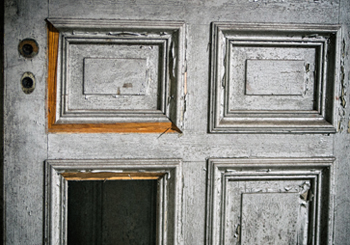by Jennifer Hackbarth
“All the time and energy I spend in keeping some kind of balance and preventing myself from being tipped over and drowning shows that my life is mostly a struggle for survival: not a holy struggle, but an anxious struggle resulting from the mistaken idea that it is the world that defines me.” –Henri Nouwen, The Return of the Prodigal Son: A Story of Homecoming.
My husband and I bought our first home six years ago. It needed work. The brass light fixtures hung crookedly, the deck railings spread dangerously far apart, the cracks in the windows spewed cold air and the bathroom started dripping water into the basement the second week after we moved in. Yet we were optimistic about how quickly we’d fix it up. We soon learned house projects are expensive and tiring, and patience and determination would be as crucial as the right tools.
 Striving for balance in life is like doing upkeep on a house—it’s a nice goal, but it will never be achieved. As soon as I feel slightly caught up on the daily, weekly, monthly chores that need to be done, the roof starts leaking and a nasty crack zigzags across the foundation. House projects never end; a balanced life is an unattainable dream. Working toward balance leaves me crazy and flustered and I wonder why I can’t flawlessly arrange my life tasks and priorities like a house maintenance checklist—until I remember my maintenance checklist is stuffed into a drawer, forgotten in the midst of a cleaning frenzy when I knew guests were arriving soon and I wanted to look somewhat put together.
Striving for balance in life is like doing upkeep on a house—it’s a nice goal, but it will never be achieved. As soon as I feel slightly caught up on the daily, weekly, monthly chores that need to be done, the roof starts leaking and a nasty crack zigzags across the foundation. House projects never end; a balanced life is an unattainable dream. Working toward balance leaves me crazy and flustered and I wonder why I can’t flawlessly arrange my life tasks and priorities like a house maintenance checklist—until I remember my maintenance checklist is stuffed into a drawer, forgotten in the midst of a cleaning frenzy when I knew guests were arriving soon and I wanted to look somewhat put together.
Look in any women’s magazine and you’ll find an article promising tips that will help women achieve that mysterious goal of a balanced life—but how will we know when we’ve finally achieved it? My husband and I have done a multitude of projects on our home over the past six years, and I still can’t walk through it without seeing the scratches and dents and marks and nicks that have accumulated. When I have a balanced life, will I be able to sigh, sit back and be content? And will it last more than six seconds before something comes tumbling down?
Another tool for a balanced life
 Striving for balance triggers all my ugly perfectionistic tendencies; it doesn’t feel life-giving to me. Elizabeth Gilbert says, “[Balance] has become another tool in the arsenal that women especially are using against themselves as one more thing they’re not doing right.” I don’t want the pursuit of a balanced life to distract me from all that’s already good in my life.
Striving for balance triggers all my ugly perfectionistic tendencies; it doesn’t feel life-giving to me. Elizabeth Gilbert says, “[Balance] has become another tool in the arsenal that women especially are using against themselves as one more thing they’re not doing right.” I don’t want the pursuit of a balanced life to distract me from all that’s already good in my life.
Living in a home teaches me not only patience, but also acceptance. I can’t enjoy my house if I’m constantly looking for flaws. There are always projects to be done, but that’s part of the fun. And the imperfections are what I love most about our house: the scratches on the floor from excited puppy claws, the stains on the countertop from countless meals cooked, the marks above the doors on our armoire—the first piece of furniture my husband and I bought together—now a holder for preschool art supplies.
I doubt balance was Jesus’ first priority in his earthly ministry. In Matthew 14, Jesus is desperate to be alone to grieve his cousin John, but the crowds converge and he has compassion on them, filling them with food and God’s word. It’s an unplanned, chaotic event, and Jesus stands right in the mess of it all. Yet immediately after the crowds disperse, Jesus trudges to a mountain to be alone in prayer. He’s exhausted, depleted, overwhelmed, burned out, done.
Balance promises us a drama-free life with everything in its proper place, all the time. It tells us that if we keep enough lists, we’ll never break down or burn out or forget to pay a bill or pick up our kids. But if Jesus couldn’t achieve it, how can we? The incarnation is messy. To be human is to sometimes (or often) feel it’s all too much.
Jesus may not have been balanced, but he was centered. He knew exhaustion, but he also knew where to go to find renewal. Houses need to be built in a certain order; tiles can’t be laid until the floor is level, cupboards can’t be painted before they’re sanded, walls can’t be raised before the foundation is set. Our homes and lives may be in disarray, but frantically buying more tools and making improvement plans may distract us from what we really need. Stopping to sit in God’s presence, engaging Scripture and prayer, will strengthen our foundations and help us to accept life as it is: unpredictable, glorious chaos. A beautiful, imperfect, unbalanced mess, with God as our loving, graceful, merciful, forgiving center.
Discussion questions:
1. What would a balanced life look like to you? What have you done to achieve it? Do you think a balanced life is possible?
2. What does your ideal life look like? Is this a life-giving vision, or an unattainable goal?
3. Scripture tells us that when Jesus is overwhelmed, he searches out a quiet place to pray. When life is too much, how do you cope? What centers you?
Closing prayer:
God of mercy, you fully embraced the chaotic messiness of this world. Teach us to let go of unrealistic expectations and build our foundations on your love and grace. Amen.
Jennifer Hackbarth is solo pastor at Christ the King Lutheran Church in White Bear Lake, MN, where she has served for over six years. She enjoys cooking, reading, travel and spending time with her husband and two kids, ages five and eight. You may find her other reflections on faith and daily life at www.narratinggrace.wordpress.com.
Photos by C. K. Koay, Elizabeth McBride, Aaron Marshall and Tobias Dick. Used with permission.


This piece really speaks to me. I don’t like the word balance at all and wrote a similar post to the one above. I agree whole heartedly that this is just another “word” that brings guilt to men and women trying to make it out there in this crazy world.
I also really liked the example of Jesus going to pray for rejuvination- I’m not one to pray much so this is a good reminder.
I like the thinking that achieving a balanced life is impossible and one more item to add to the list of things women can’t do.
Thank you. Your words are well met with me.
This is why Sunday morning worship is so important to my life. It is a time to sing, commune and step back. It gives me perspective, some times an answer to a problem. I wish I knew how to communicate that to others better than I do. Good read–thanks!
Dear Jennifer, Thank you for this. It helped create a little bit of peace in a place where I have been trying to stuff remodeling ideas. I realized, after reading this essay, that I should kick back and enjoy the process and stop worrying because it wasn’t finished. Good job.
What a peace- & reality- bringing reflection! Many thanks!
I really did love this, thank you!